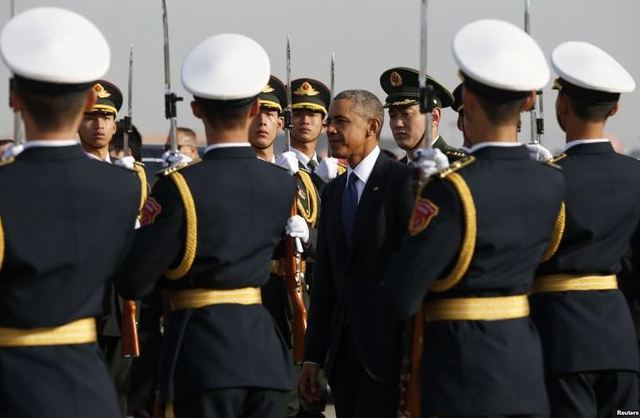 U.S. President Barack Obama passes an honor guard upon his arrival in Beijing, Nov. 10, 2014. (Reuters)
U.S. President Barack Obama passes an honor guard upon his arrival in Beijing, Nov. 10, 2014. (Reuters)
By Luis Ramirez
November 10, 2014
BEIJING — President Barack Obama has arrived in Beijing on what is expected to be a polite but difficult three-day visit as tensions simmer between the two Pacific powers.
Obama arrived in the Chinese capital on Monday to a welcome that had all the trappings of a state visit. Still ahead is a dinner with Chinese President Xi Jinping and other Asia-Pacific leaders and, later, fireworks.
But with China growing more powerful both economically and militarily, there are tensions beneath the veneer of courtesy and pomp Obama was afforded at his arrival.
Evan Medeiros, the top official for Asian Affairs in the president’s National Security Council, told reporters that in coming here, Obama – in the rest of his term – wants to build a stable and diversified security order in which both powers can co-exist peacefully in the region.
“We see this trip as an important opportunity to define a forward-looking agenda for the U.S.-China relationship over the next two years, and to ensure that the U.S.-China relationship is defined for the most part by more and better and higher-quality cooperation on regional and global challenges, while also carefully managing the disagreements between the two countries,” said Medeiros.
Pushing an agenda of greater cooperation will not be easy for Obama, who comes here politically weakened by elections at home. And there are signs the welcome he is getting from the Chinese is only superficial.
In the days before the U.S. leader’s arrival, Chinese official newspapers have published disparaging remarks about Obama, including one describing him as “insipid,” and saying the results of recent U.S. elections show Americans are tired of his “banality.”
The United States is concerned about the continuing trade deficit, cyber issues, and Chinese maritime claims in the East and South China Seas. President Obama wants to dispel the impression among Chinese leaders that the U.S., through the rebalance of its forces to the Pacific, is trying to contain China.
U.S. administration officials say they are expecting frank discussions. But Wilson Center analyst Robert Daly, a former U.S. diplomat in China, said the talks will emphasize the positive elements of the relationship and not get to the heart of the tensions between the existing power and the one that is rising.
“To date, neither side is willing to specify what accommodations it is willing to make. Or in the case of China, what it is, specifically, that it doesn’t like about the current set of arrangements in the western Pacific. China has never answered what it is that it would like to be able to achieve that it can’t achieve under the current set of arrangements,” said Daley.
Over the next two days Obama will participate in a summit of the Asia Pacific Economic Cooperation group APEC. U.S. officials see APEC as a means to set rules that will prevent conflicts in the region and hope this meeting will help them make progress on trade, cyberspace, and climate issues.
On Wednesday, President Obama’s official part of the visit begins and it is then that the more substantial conversations will happen with the Chinese leader behind closed doors.
Obama will depart Beijing later Wednesday to make his second to visit to Myanmar, also known as Burma. There, he will attend two East Asian summits before going to Australia for a gathering of the G20.
—
Join the conversation on Twitter and Facebook.

























